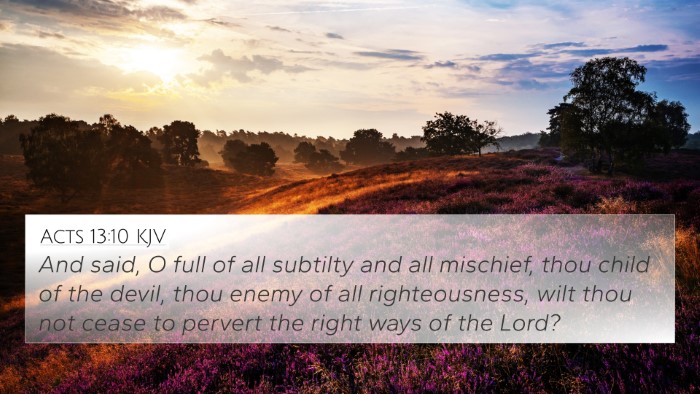Meaning and Interpretation of 2 Chronicles 17:6
2 Chronicles 17:6 states: "And his heart was lifted up in the ways of the LORD: moreover he took away the high places and groves out of Judah." This verse highlights King Jehoshaphat's dedication to God and his reforms aimed at uplifting the worship practices in his kingdom.
This analysis amalgamates insights from various public domain commentaries, which can help those seeking deeper understanding of this verse and its implications.
Summary of Key Insights
- Heart Lifted Up: Jehoshaphat's heart being "lifted up" indicates his zeal and commitment to following God's ways.
- Ways of the LORD: This phrase refers to the divine paths guided by God's laws and statutes, acting as moral and ethical guidelines for the people of Judah.
- Removal of High Places: High places were sites used for worship of idols. Jehoshaphat's actions signify a return to pure worship and his efforts to eliminate idolatry.
- Importance of Reform: Jehoshaphat exemplified leadership that prioritized spiritual reformation over political alliances or military might.
- Judah's Spiritual State: Through Jehoshaphat's reforms, Judah experienced a spiritual awakening, aimed at reconnecting the people with their covenantal obligations to God.
Cross-Section of Related Bible Verses
To further comprehend 2 Chronicles 17:6, we can reference several related verses:
- 1 Kings 22:43: Highlights the good works of Jehoshaphat in his reign, reinforcing his efforts to follow God.
- 2 Chronicles 19:4: Jehoshaphat's active pursuit of spiritual knowledge and reform.
- 2 Chronicles 20:3: Illustrates his reliance on prayer during threats, indicative of his commitment to God.
- 2 Kings 14:3: Relates to kingly reforms and the importance of walking in the ways of the Lord.
- Proverbs 4:23: "Keep thy heart with all diligence; for out of it are the issues of life,” emphasizing the significance of a devoted heart.
- Isaiah 55:6-7: Encourages turning back to God, similar to Jehoshaphat’s reforms.
- 2 Chronicles 15:12-15: Describes the covenant renewal under King Asa, reflecting the importance of heartfelt service.
Thematic Connections
The themes within 2 Chronicles 17:6 resonate through various Biblical passages, illustrating a consistent message about devotion and reform:
- Devotion to God: Similar themes of devotion are seen in Psalm 119:10 and James 4:8.
- Spiritual Reforms: The call for reform can also be connected to Malachi 3:7 where God invites His people to return to Him.
- Idolatry Rejection: The removal of high places correlates with commands against idolatry found in Exodus 20:3-5.
Tools for Bible Cross-Referencing
To explore further, various tools can aid in cross-referencing:
- Bible Concordance: A comprehensive listing of biblical words that assists in finding verses.
- Cross-Reference Bible Study Guides: Guided approaches to studying related scriptures.
- Bible Reference Resources: Tools that provide context and connections to various biblical themes.
How to Use Bible Cross-References
For those wanting to dive deeper into scriptural texts:
- Identify Themes: Connecting verses helps to build a fuller understanding of biblical themes, such as the relationship between the Old and New Testament.
- Comparative Analysis: Analyze similar accounts across the Gospels for greater insight into the life of Christ.
- Thematic Studies: Conduct detailed thematic studies, linking verses related to faith, obedience, and divine guidance.
Conclusion
In summary, 2 Chronicles 17:6 serves as a significant verse illustrating Jehoshaphat's heart for God and his proactive steps in reforming worship in Judah. This verse invites readers to reflect on the importance of their own spiritual devotion and the necessity of removing anything that hinders a true relationship with God. Understanding its implications through cross-references and thematic analysis enriches one's study of the Bible.
















